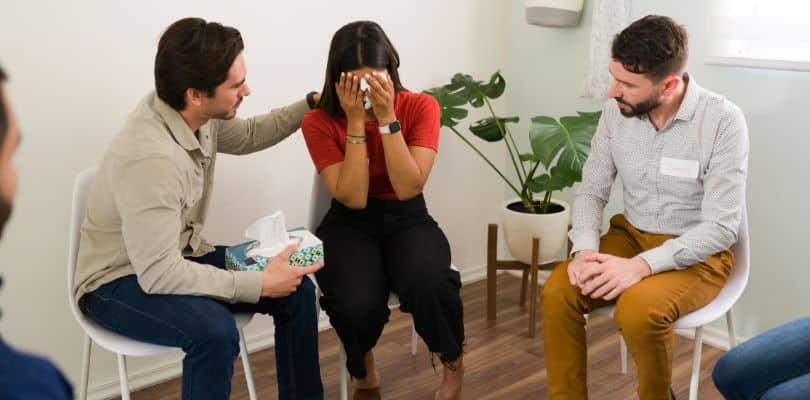- Home
- What We Treat
- Anxiety
Table of Contents
ToggleAnxiety
Anxiety Treatment in Fort Lauderdale, FL
As a normal, natural part of the human experience, anxiety can actually be quite helpful. People are inherently hard-wired to feel anxious in high-risk situations and settings. In these instances, anxiety helps them proceed with caution, recognize and mitigate the dangers they may be facing, and take action to avoid potentially disastrous outcomes. However, when anxiety is extreme and experienced all of the time, and when there are no justifiable causes for feeling anxious, it may be a treatable disorder. General anxiety disorder (GAD) is a common issue that affects approximately three percent of all Americans.
Sadly, many people don’t seek help when feeling excessively anxious. Instead, they often blame themselves for being unable to manage their stress effectively. Worse still, when there are no known ways of alleviating persistent anxiety, many turn to drugs or alcohol addiction for relief. Unlike normal, natural anxiety that encourages people to protect themselves, GAD makes it virtually impossible for people to maintain healthy, productive lives.
Don’t let anxiety disorder control your life. If you or a loved one is struggling with mental illness or substance abuse, our treatment programs in Fort Lauderdale, FL can help you achieve recovery.

Types of Anxiety Disorders
There are actually five recognized types of anxiety disorders. Each differs in cause, symptoms, behavior, and effective treatment types. They include:
- General anxiety disorder
- Panic disorder
- Post-Traumatic Stress Disorder (PTSD)
- Social anxiety disorder or social phobia disorder
- Obsessive-compulsive disorder (OCD)
The common denominator across all anxiety types is anxiety itself. However, whereas, people with PTSD have experienced one or more traumatic life events that have left them unable to deal with loud, jarring sounds, busy and densely populated environments, and significant amounts of social interaction, people with OCD feel compulsively compelled to engage in ritualistic behaviors such as repetitively washing their hands. These rituals make them feel “safe” from unknown, unseen, and often ill-defined threats. They are also time-consuming, intrusive, and difficult to maintain.
Panic disorder is characterized by brief, unexpected episodes of intense anxiety known as panic attacks. Panic attacks leave many people unable to breathe, focus, or act. They can occur at work, while driving, or while caring for others. Social phobia disorder makes it difficult for people to interact with others or take part in public activities. People with social anxiety disorder have a hard time making and maintaining friends, speaking in both informal and formal settings, and engaging in many expected everyday activities.
Risk Factors for Anxiety Disorder
Just as many people turn to drugs or alcohol to alleviate their anxiety, alcohol and substance abuse can actually be catalysts for anxiety disorders. When people abuse substances, chemical changes that occur in both their brain functioning and their brain chemistry set the stage for extreme anxiety. In fact, anxiety is recognized as being one of the most common psychological withdrawal symptoms for many substance types, and one of the most common long-term side effects of prolonged substance abuse. Thus, the same substances that people use to self-treat anxiety can actually exacerbate their symptoms and make the road to recovery significantly more challenging.
In addition to substance abuse, other risk factors for anxiety include:
- Past or present trauma
- A family history of anxiety disorders
- Other mental health disorders
- Personality
- Excessive environmental stress
- Nutritional deficiencies
- Hormonal imbalance
Various lifestyle factors can also lead to intense feelings of anxiety and eventual anxiety disorder. These include poor sleep hygiene or prolonged bouts of untreated insomnia, excess caffeine consumption or the use of other stimulants, and toxic relationships or toxic living situations. Even living with extraordinary amounts of psychological stress while lacking an effective stress management plan can create physiological conditions for anxiety disorders. Untreated anxiety lowers immune functioning, causes chemical imbalances, and may contribute to the development of gland problems among other issues.
Symptoms of General Anxiety Disorder
General anxiety disorder can be distinguished from normal anxiety in that GAD causes people to feel anxious all of the time. When there is no known reason for feeling anxious, people do not have an easy way of changing their mood. Thus, one of the biggest symptoms of GAD is feeling incredibly anxious for absolutely no discernible reason at all. Other symptoms of GAD include:
- The frequent and rapid onset of physical and psychological fatigue
- Persistent feelings of irritability
- Difficulty concentrating
- Sleep troubles
- Heart palpitations
- Stress headaches
- Hypervigilance
A person with GAD is often always waiting for “the other shoe to drop”. Although they might not have an identifiable cause for their excessive worry, they may suspect that the reason for their fear is looming just around the corner. GAD causes extreme, irrational feelings of fear that make it difficult to enjoy life, engage with others and get things done.
If you are experiencing symptoms of anxiety disorder, seek mental health treatment in Florida immediately. We can help you take steps toward healthy living.

How is Anxiety Diagnosed?
Much like common causes and treatment, diagnosis for each of the five anxiety disorders is different. For OCD, therapists look at psychological and physical symptoms like:
- Obsessions
- Compulsive behaviors
- Evidence that obsessions and compulsive behaviors are preventing the individual from living normally
Untreated OCD is also rarely a static issue. A person with only one obsession and one set of rituals that must be performed will often develop new obsessions and new compulsions over time. Thus, therapists additionally look for behaviors that are becoming increasingly disruptive to normal living.
With PTSD, mental health professionals look for evidence of past trauma. PTSD is incredibly common among veterans, survivors of sexual and physical assault, and victims of domestic violence. However, PTSD can also be caused by events like major car accidents, sudden family deaths, and even serious threats of bodily harm. Before diagnosing a person with PTSD, therapists look for five common symptoms:
- Traumatic life events
- Evidence of reliving these events mentally
- Avoidance of external triggers or reminders of past trauma
- Dramatic and sporadic changes in behavior, thinking, or mood
- Altered states of anxiety
More often than not, medical exams are also performed to rule out any medical problems that may be responsible for a person’s anxiety. For instance, diagnosis for generalized anxiety disorder can include blood and urine tests, and other forms of medical assessment to rule out medications, imbalances, or illness as the underlying cause for extreme anxiety. Therapists look for anxiety that causes functional impairment or the inability to engage in everyday activities. General anxiety disorder, panic disorder, and social anxiety disorder can be difficult to distinguish in many cases. In all instances, evidence of difficulty concentrating, general irritability, muscle tension, and ongoing sleep disturbances are considered. For each anxiety type, five or more known symptoms of the disorder must be present simultaneously, and for an extended period of time.

Treatment Options for Anxiety Disorder
Many people with undiagnosed anxiety disorders wind up in emergency rooms or schedule urgent appointments with their general doctors when they can no longer manage or tolerate their symptoms on their own. When diagnosing or treating anxiety disorders is rushed, or when patients fail to follow these visits up by scheduling appointments with licensed mental health professionals, they often end up in medication-assisted treatment (MAT), including the use of benzodiazepine drugs. Benzodiazepines are both fast-acting and incredibly effective for alleviating anxiety. These drugs trigger the release of the calming neurotransmitter called gamma-Aminobutyric acid (GABA). Unfortunately, when benzos are taken for too long or overused, people become addicted and many of their anxiety symptoms intensify.
Long-term medical treatments for anxiety are far more effective and often involve the use of antidepressant medications including selective serotonin reuptake inhibitors (SSRIs) or monoamine oxidase inhibitors (MAOIs). Although SSRIs and MAOIs are not as fast-acting as benzodiazepines, they are not habit-forming. More importantly, they serve as lasting solutions by addressing anxiety disorders at their source, rather than merely muting symptoms. Anxiety treatments additionally include cognitive behavioral therapies, stress management training, and other elements that help people naturally manage their symptoms.
Is Treatment Right for Me?
Mental health and drug addiction treatment is a good fit for anyone who is experiencing a behavioral health problem and needs help. Whether you need inpatient or outpatient treatment, Agape can help you find the perfect treatment plan to fit your needs.
With many different recovery options, patients can stop using and find recovery with the support of our experts. Some people need more intense rehab and will need to check in for inpatient treatments, while other individuals can manage things with outpatient programs. The goal is the same regardless of your substance abuse problems: long-term recovery. No matter what your needs are, we are just a phone call away.
Seek Professional Help at our Anxiety Treatment Center in Fort Lauderdale, Florida
At Agape Treatment Center, we offer sustainable strategies for managing anxiety disorders over the long term. We take a holistic approach that helps our patients achieve increased overall wellness. If you’ve been self-treating your anxiety, our treatment programs will give you a better understanding of your disorder and the tools that you need to live a happy and addiction-free life. Contact us today to speak with our admissions coordinators and to start the enrollment process.
- February 22, 2023
- Updated Date: June 28, 2024
Addiction Recovery Services

Stephanie Robilio, LCSW( Medical Reviewer )
Stephanie Robilio is an accomplished Clinical Director at Agape Behavioral Healthcare. With a Master of Social Work degree, LCSW license, and extensive training in Rapid Resolution Therapy under her belt, she brings a wealth of expertise to her role. Her unique combination of education and experience allows her to provide exceptional care to clients and lead her team with confidence. Stephanie’s joy comes from witnessing the moments when her patients creatively connect the dots and bravely move toward reclaiming their power. Her purpose is to help individuals understand their past so they can create a future full of hope, growth, and success. Stephanie attributes a large portion of her success to the supportive culture and strong sense of community fostered by the Agape team.



